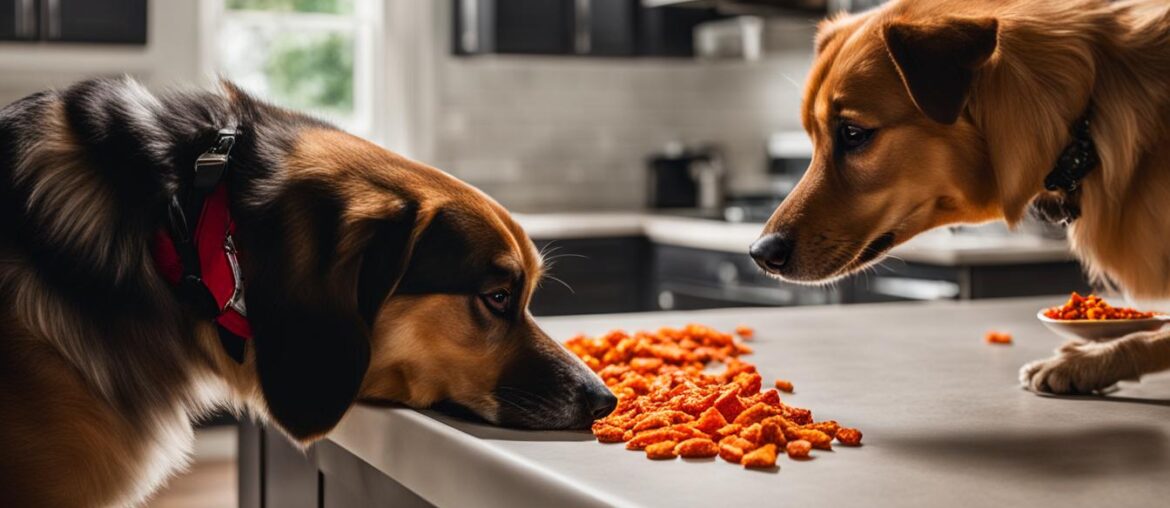When it comes to feeding dogs, it’s important to understand which foods are safe and which ones can be harmful. Hot Cheetos, a popular snack among humans, may be tempting to share with our furry friends, but are they safe for dogs to eat? In this article, we will explore the potential effects of feeding dogs hot Cheetos and provide insights into healthier snack alternatives for their diet.
Are Hot Cheetos Safe for Dogs?
While it may be tempting to give your dog a taste of hot Cheetos, they are not considered safe for canine consumption. Hot Cheetos contain ingredients that can be harmful to dogs, such as onions, garlic, and excessive amounts of spice.
Onions and garlic, both commonly found in hot Cheetos, contain compounds that can damage a dog’s red blood cells, leading to a condition called hemolytic anemia. This can result in weakness, lethargy, pale gums, and even organ damage.
In addition to onions and garlic, the excessive spice in hot Cheetos can cause digestive issues in dogs. Dogs have sensitive stomachs and are not able to handle spicy foods as well as humans. Eating hot Cheetos can lead to upset stomach, diarrhea, and discomfort for your furry friend.
It’s important to remember that dogs have different nutritional needs and digestive systems compared to humans. While hot Cheetos may be a tasty treat for us, they can be harmful to our canine companions.
“Hot Cheetos contain ingredients that can be harmful to dogs, such as onions, garlic, and excessive amounts of spice.”
If you accidentally give your dog hot Cheetos or suspect they may have consumed some, it’s best to monitor them closely for any signs of discomfort or illness. Contact your veterinarian for guidance to ensure your dog’s health and well-being.
Instead of hot Cheetos, provide your dog with dog-friendly snacks that are safe and nutritious. There are plenty of options available, such as:
- Sliced fruits like apples or bananas
- Baby carrots
- Plain popcorn (without seasoning or butter)
- Cooked sweet potatoes
- Natural dog treats specifically made for dogs
These alternatives not only provide dogs with essential nutrients but also reduce the risk of digestive issues and allergic reactions.
Effects of Eating Hot Cheetos on Dogs
If a dog consumes hot Cheetos, it can have various negative effects on their health. The spices and excessive salt in hot Cheetos can cause gastrointestinal upset, including vomiting and diarrhea. The ingredients in hot Cheetos can also lead to stomach pain, gas, and discomfort for dogs. Additionally, some dogs may have allergic reactions to the spices or other additives in hot Cheetos, resulting in itching, skin irritations, or even more severe allergic reactions.
Can Hot Cheetos Be Fatal for Dogs?
While hot Cheetos are not directly fatal to dogs, excessive consumption of them can lead to serious health issues. The combination of high spice content, onions, and garlic present in hot Cheetos can cause gastrointestinal irritation, potentially leading to more severe conditions. Dogs that regularly ingest hot Cheetos or consume them in large quantities may experience stomach ulcers, pancreatitis, or other digestive system problems. Therefore, it is crucial to keep hot Cheetos and similar spicy snacks away from dogs to prevent potential harm.
Healthier Snack Alternatives for Dogs
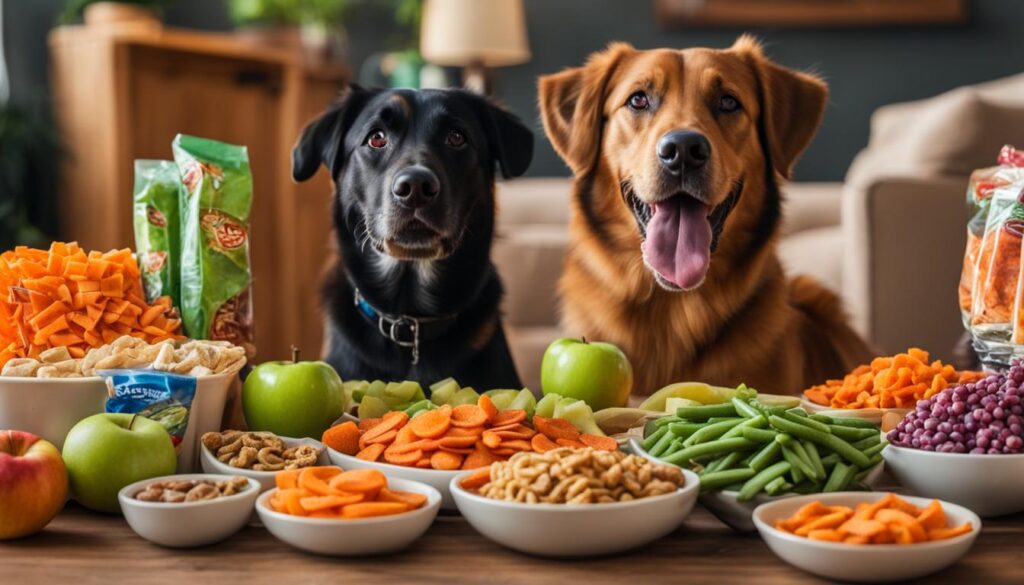
When it comes to treating our furry friends, it’s important to choose snacks that are not only delicious but also safe and nutritious. Instead of indulging dogs with hot Cheetos, which can be harmful to their health, there are plenty of alternative options that can satisfy their cravings and provide valuable nutrients.
Here are some dog-friendly snack alternatives that are both safe and delicious:
- Sliced fruits like apples or bananas: These fruits are not only refreshing but also provide dogs with essential vitamins and fiber.
- Baby carrots: Low in calories and high in nutrients, baby carrots make a great crunchy snack for dogs.
- Plain popcorn (without seasoning or butter): Popcorn can be a fun and light treat for dogs, as long as it is plain and free from added salt or toppings.
- Cooked sweet potatoes: Sweet potatoes are packed with vitamins and minerals, and when cooked and cooled, they make a tasty and healthy snack option for dogs.
- Natural dog treats specifically made for dogs: Many companies offer a wide variety of dog treats made from quality ingredients, ensuring both taste and nutritional value.
These alternatives provide dogs with necessary nutrients, promote good digestive health, and reduce the risk of allergic reactions or digestive problems associated with unhealthy snacks.
| Snack Option | Nutritional Benefits | Taste and Texture |
|---|---|---|
| Sliced fruits like apples or bananas | Provides essential vitamins and fiber | Naturally sweet and crunchy |
| Baby carrots | Low in calories, high in nutrients | Crunchy and satisfying |
| Plain popcorn (without seasoning or butter) | Light and low-calorie snack | Air-popped and crunchy |
| Cooked sweet potatoes | Packed with vitamins and minerals | Soft and chewy |
| Natural dog treats specifically made for dogs | Targeted nutritional benefits | Varies depending on the treat |
These alternatives offer a range of flavors, textures, and nutritional profiles to cater to your dog’s preferences and dietary needs. It’s always a good idea to consult with your veterinarian to determine the best snack options for your specific dog, taking into consideration any dietary restrictions or health conditions they may have.
By choosing healthier snack alternatives, you can ensure that your beloved furry companion enjoys tasty treats while maintaining their overall well-being.
Understanding Canine Diet and Nutrition
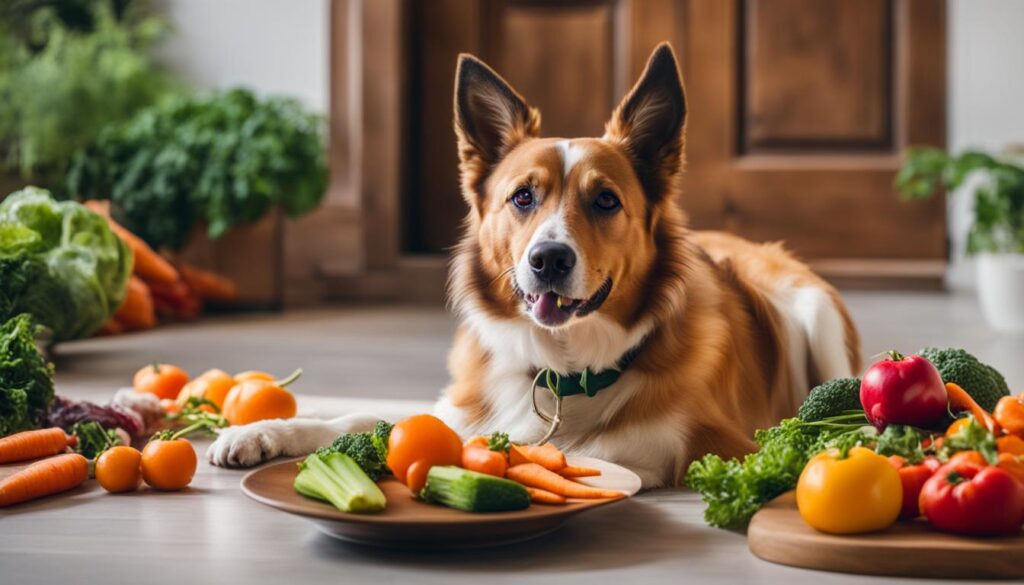
Canine nutrition is essential for the overall health and well-being of our furry friends. Dogs require a balanced diet that provides them with the necessary nutrients to support their growth, energy levels, and various bodily functions. It’s important to understand the impact of unhealthy snacks, such as hot Cheetos, on their diet.
Dogs should not consume hot Cheetos or similar unhealthy snacks on a regular basis. These snacks lack nutritional value and can have detrimental effects on their health. Hot Cheetos contain excessive amounts of salt, unhealthy fats, and artificial ingredients that can cause digestive issues and contribute to obesity in dogs.
Consulting with a veterinarian or a professional canine nutritionist is crucial in creating an appropriate diet plan for your dog. They can provide guidance on selecting nutritious foods that meet your dog’s specific nutritional needs. A well-balanced diet will ensure that your canine companion receives the essential vitamins, minerals, and proteins necessary for their optimal health.
Benefits of a Balanced Canine Diet
A balanced diet plays a crucial role in maintaining your dog’s health and preventing potential health issues. By adhering to a nutritious diet plan, you can:
- Promote proper growth and development
- Support a strong immune system
- Improve digestion and gastrointestinal health
- Enhance energy levels and vitality
- Prevent nutrient deficiencies and related ailments
- Maintain a healthy weight
By providing your dog with a well-balanced diet, you are setting a foundation for their long-term health and well-being.
Recommended Canine Foods and Snacks
When it comes to selecting dog-friendly snacks, there are plenty of options that are both nutritious and safe for consumption. Consider incorporating the following foods into your dog’s diet:
| Food | Benefits |
|---|---|
| Sliced fruits like apples or bananas | Provide essential vitamins and fiber |
| Baby carrots | Low in calories and a good source of antioxidants |
| Plain popcorn (without seasoning or butter) | High in fiber and low in calories |
| Cooked sweet potatoes | Rich in vitamins and minerals |
| Natural dog treats specifically made for dogs | Designed to meet their nutritional needs |
These snack alternatives not only offer nutritional value but also reduce the risk of digestive issues and allergic reactions in dogs.
By prioritizing your dog’s nutrition and selecting appropriate foods, you can help them lead a healthier and happier life. Remember, the well-being of your beloved canine companion starts with a well-balanced diet.
Signs of Hot Cheeto Toxicity in Dogs
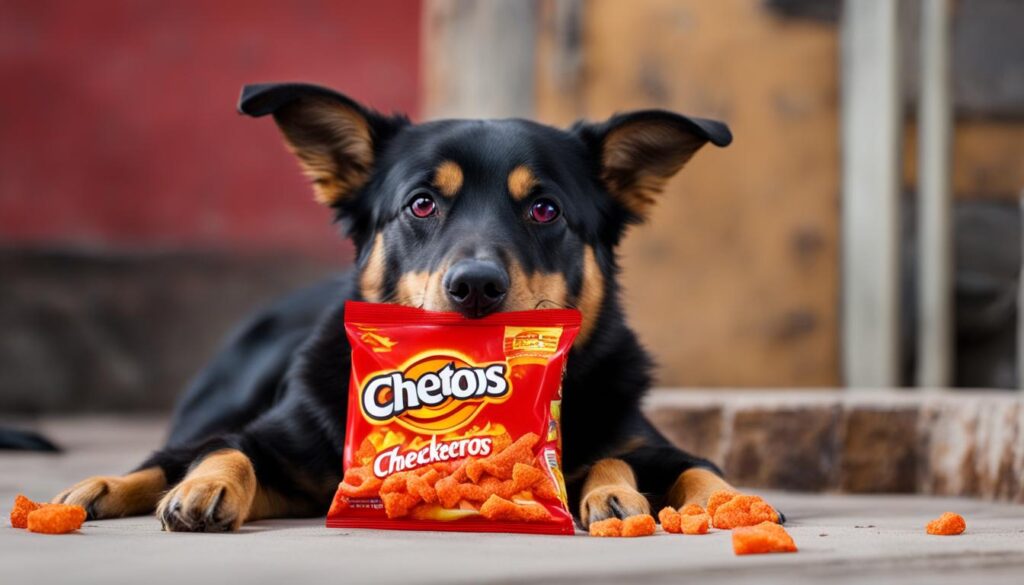
If a dog accidentally consumes hot Cheetos or any other spicy snack, it’s essential to be aware of the signs of toxicity. Common symptoms of hot Cheeto toxicity in dogs may include:
- Vomiting
- Diarrhea
- Excessive drooling
- Abdominal pain
- Dehydration
- Restlessness
- Difficulty breathing
If you notice any of these signs or suspect your dog has ingested hot Cheetos, it is crucial to contact your veterinarian immediately for guidance and assistance. Prompt action can help prevent further complications and ensure the well-being of your furry companion.
| Symptom | Description |
|---|---|
| Vomiting | Expelling stomach contents forcefully through the mouth |
| Diarrhea | Loose or watery stools |
| Excessive Drooling | Noticeable increase in saliva production |
| Abdominal Pain | Pain or discomfort in the abdominal area |
| Dehydration | Loss of fluids and electrolytes in the body |
| Restlessness | Unable to remain calm or settled |
| Difficulty Breathing | Labored or troubled breathing |
Consult with a Veterinarian
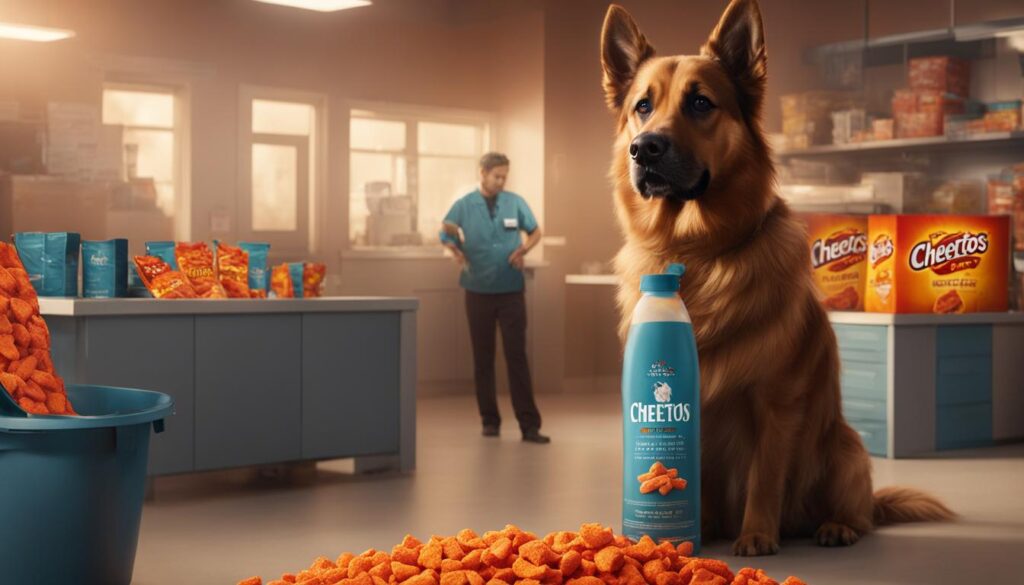
When it comes to your dog’s health and nutrition, it’s always best to consult with a veterinarian. If you have any concerns about feeding your dog hot Cheetos or any other questionable foods, seeking professional guidance is essential. Veterinarians can provide personalized advice based on your dog’s specific needs, dietary restrictions, and overall health conditions. They are well-versed in canine nutrition and can help you make informed decisions about your dog’s diet.
Feeding hot Cheetos to dogs can have detrimental effects on their health, so it’s crucial to reach out to a veterinarian if you’re unsure about certain foods. They can offer recommendations on suitable snacks and provide you with a comprehensive understanding of the potential risks and benefits associated with different types of food.
Additionally, if you suspect that your dog has ingested hot Cheetos or any other harmful foods, it is important to contact your veterinarian immediately. They can assess the situation and provide appropriate guidance on the next steps to take to ensure your dog’s well-being.
| Benefits of Consulting with a Veterinarian: |
|---|
| Personalized guidance based on your dog’s needs |
| Expert advice on canine nutrition |
| Identification of potential risks and harmful effects |
| Recommendations for suitable snacks and alternatives |
| Timely assistance in case of accidental ingestion |
Wrapping Up
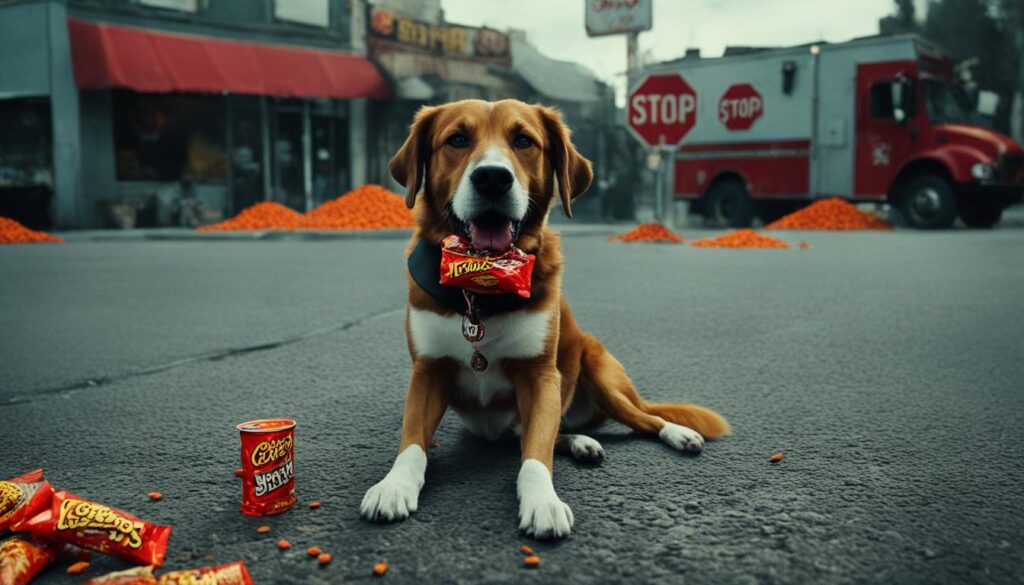
After exploring the potential effects of feeding hot Cheetos to dogs, it is clear that these spicy snacks are not safe for canines. The ingredients and spices found in hot Cheetos can cause digestive issues, allergic reactions, and even toxicity in dogs. It is important to prioritize the health and well-being of our furry friends by providing them with safe and nutritious snack alternatives.
Instead of sharing hot Cheetos, dog owners should opt for dog-friendly snacks that are specifically designed to meet their nutritional needs. Sliced fruits like apples or bananas, baby carrots, plain popcorn, cooked sweet potatoes, or natural dog treats are all healthier options. These snacks not only provide essential nutrients but also minimize the risk of digestive issues or allergic reactions.
Always consult with a veterinarian for personalized advice on your dog’s diet and nutritional needs. They can provide valuable insights and guidance to ensure that your furry friend receives the best care possible. By making informed decisions and prioritizing their health, we can ensure that our dogs lead happy and healthy lives free from the harmful effects of hot Cheetos and other unhealthy snacks.
Dog-Friendly Snack Alternatives
| Snack Alternatives | Nutritional Benefits |
|---|---|
| Sliced fruits (apples, bananas) | Rich in vitamins and minerals |
| Baby carrots | Low in calories and high in fiber |
| Plain popcorn | Low in fat and sodium |
| Cooked sweet potatoes | Excellent source of fiber and vitamin A |
| Natural dog treats | Specifically formulated for canine health |
By offering these dog-friendly snack alternatives, you can ensure that your dog receives the necessary nutrients without compromising their health. Remember, always consult with a veterinarian for personalized advice and recommendations based on your dog’s specific dietary requirements and health condition.
Additional Resources and Tips for Dog Owners
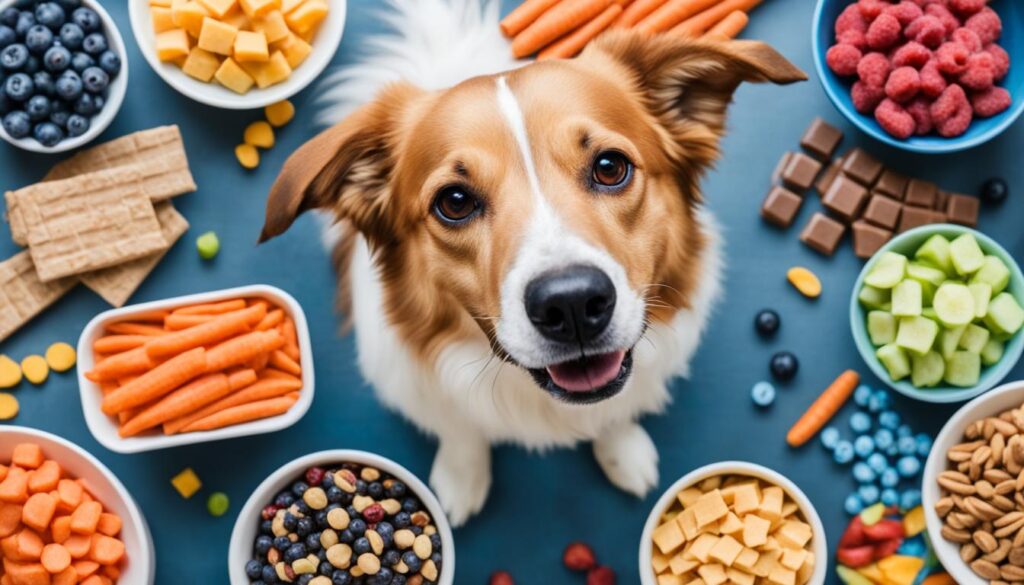
For more information on dog-friendly snacks, harmful foods for dogs, and canine nutrition, check out reputable sources such as veterinary websites, books on canine nutrition, or consult with a professional dog nutritionist. These resources can provide valuable insights and guidance on how to make informed decisions about your dog’s diet and ensure their overall well-being.
When it comes to the health and nutrition of our beloved pets, it’s essential to stay informed and educated. Understanding which foods are safe for dogs and which ones can be harmful is crucial in maintaining their well-being. If you’re looking for more information on dog-friendly snacks, harmful foods to avoid, and valuable tips on canine nutrition, there are various resources available that can provide the guidance you need.
Reputable Veterinary Websites
One of the most reliable sources of information on dog health and nutrition is reputable veterinary websites. These websites are maintained by licensed veterinarians and offer a wealth of knowledge on a wide range of topics related to pet care. They provide accurate and up-to-date information on dog-friendly snacks, harmful foods for dogs, and proper canine nutrition. Some popular veterinary websites that you can explore include:
- The American Veterinary Medical Association (AVMA) – www.avma.org
- The American Society for the Prevention of Cruelty to Animals (ASPCA) – www.aspca.org
- PetMD – www.petmd.com
Books on Canine Nutrition
If you prefer a more in-depth approach to learning about dog nutrition, there are numerous books available that cover the subject extensively. These books are written by experts in the field and provide valuable insights and practical tips for maintaining a healthy diet for your dog. Some recommended books on canine nutrition include:
- “Canine Nutrigenomics: The New Science of Feeding Your Dog for Optimum Health” by W. Jean Dodds and Diana Laverdure
- “Raw and Natural Nutrition for Dogs: The Definitive Guide to Homemade Meals” by Lew Olson
- “Dog Food Logic: Making Smart Decisions for Your Dog in an Age of Too Many Choices” by Linda P. Case
Consult with a Professional Dog Nutritionist
If you want personalized advice and guidance on your dog’s diet and nutrition, consulting with a professional dog nutritionist can be immensely helpful. A dog nutritionist is trained to assess your dog’s specific dietary needs, consider any existing health conditions or dietary restrictions, and create a customized nutrition plan. They can provide valuable insights into dog-friendly snacks, harmful foods for dogs, and help you make informed decisions about your pet’s diet to ensure their long-term health and well-being.
Remember, providing your dog with a balanced and nutritious diet is vital for their overall health and happiness. By utilizing the resources available and seeking professional guidance when needed, you can make informed choices about your dog’s diet and ensure that they receive the best care possible.
Comparison of Nutritional Content in Dog-Friendly Snacks
| Snack | Calories | Protein | Fat | Fiber |
|---|---|---|---|---|
| Sliced Apples (1 cup) | 52 | 0.25g | 0.17g | 1.3g |
| Baby Carrots (6 pieces) | 30 | 0.6g | 0.1g | 1.7g |
| Plain Popcorn (1 cup) | 31 | 1.0g | 0.4g | 1.2g |
| Cooked Sweet Potatoes (1/2 cup) | 90 | 2.1g | 0.1g | 3.3g |
| Natural Dog Treats (1 treat) | varies | varies | varies | varies |
Pet Health Insights – Can Dogs Eat Hot Cheetos?
Feeding hot Cheetos to dogs is not recommended due to the potential risks and harmful effects they can have on their health. Dogs have specific dietary requirements, and it’s crucial to provide them with a balanced diet that meets their nutritional needs.
Hot Cheetos are considered a harmful food for dogs as they contain ingredients like onions, garlic, and excessive spice that can cause digestive issues and upset stomach. Ingesting hot Cheetos can lead to discomfort, gastrointestinal upset, and even toxicity in dogs.
Instead of sharing hot Cheetos with your furry friend, opt for safe snacks that are suitable for dogs. There are plenty of healthier alternatives available, such as sliced fruits like apples or bananas, baby carrots, plain popcorn, cooked sweet potatoes, or natural dog treats specifically made for dogs. These alternatives offer dogs essential nutrients and are less likely to cause digestive issues or allergic reactions.
Consulting with a veterinarian is always recommended to ensure your dog’s dietary needs are being met. They can provide personalized advice based on your dog’s specific requirements and assist you in making informed decisions about their diet. Remember, your dog’s health and well-being should always be a top priority.
FAQ
Can dogs eat hot Cheetos?
No, hot Cheetos are not safe for dogs to eat. They contain harmful ingredients and spices that can cause digestive issues and potential toxicity in dogs.
What are the effects of eating hot Cheetos on dogs?
Eating hot Cheetos can lead to gastrointestinal upset, including vomiting and diarrhea. It can also cause stomach pain, gas, and discomfort in dogs. Additionally, some dogs may have allergic reactions to the spices or additives in hot Cheetos.
Can hot Cheetos be fatal for dogs?
While hot Cheetos are not directly fatal to dogs, excessive consumption can lead to serious health problems. The high spice content and ingredients like onions and garlic can cause gastrointestinal irritation and potentially more severe conditions like stomach ulcers or pancreatitis.
What are healthier snack alternatives for dogs?
Instead of hot Cheetos, offer your dog sliced fruits like apples or bananas, baby carrots, plain popcorn, cooked sweet potatoes, or natural dog treats. These alternatives are nutritious and less likely to cause digestive issues or allergic reactions in dogs.
What is the importance of canine diet and nutrition?
Canine diet and nutrition play a vital role in a dog’s overall health and well-being. Dogs require a balanced diet that provides them with the necessary nutrients to support their growth, energy levels, and various bodily functions.
What are the signs of hot Cheeto toxicity in dogs?
Signs of hot Cheeto toxicity in dogs may include vomiting, diarrhea, excessive drooling, abdominal pain, dehydration, restlessness, or difficulty breathing. If you suspect your dog has ingested hot Cheetos, contact your veterinarian for guidance.
Should I consult with a veterinarian regarding my dog’s diet?
Yes, it is always recommended to consult with a veterinarian before introducing any new food or snack into your dog’s diet. They can provide personalized advice based on your dog’s specific needs, dietary restrictions, and health conditions.
Can you provide additional resources and tips for dog owners?
For more information on dog-friendly snacks, harmful foods for dogs, and canine nutrition, check out reputable sources such as veterinary websites, books on canine nutrition, or consult with a professional dog nutritionist.
What are the pet health insights regarding dogs eating hot Cheetos?
Dogs should not eat hot Cheetos or any similar spicy snacks as they can be harmful to their health. These snacks lack nutritional value and can have detrimental effects on dogs. It is essential to prioritize their well-being by providing a balanced and nutritious diet.


